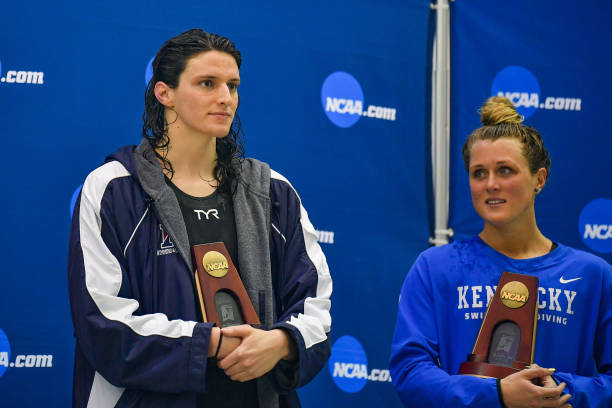U.S. Olympic Committee Pushes “Open Categories” for Trans Athletes
The U.S. Olympic and Paralympic Committee is encouraging individual sports to consider “category qualifiers” — classified in some sports as “open” categories — to ensure transgender athletes will have events to participate in once they reach puberty.
The USOPC finalized its so-called position paper at its board meeting earlier this month and released it Monday, addressing a proposed path forward for transgender participation in sports.
The committee’s recommendations were based, it said, on the principle that science and “fairness” should guide all major decisions. As part of that, the two-page paper said the emphasis in youth sports (before children reach puberty) should be to push for as much participation as possible.
Transgender woman Lia Thomas (L) of the University of Pennsylvania stands on the podium after winning the 500-yard freestyle as other medalists (L-R) Emma Weyant, Erica Sullivan and Brooke Forde pose for a photo at the NCAA Division I Women’s Swimming & Diving Championships on March 17, 2022, in Atlanta, Georgia. (Justin Casterline/Getty Images)
“Here, we believe the science is clearer that there is much less physical safety or competitive risk, or sporting advantage based on physiological sex characteristics,” the paper said.
The federation said it wanted to follow the science in determining the conditions under which transgender athletes can compete once they reach puberty, which triggers significant differences in testosterone production between biologically born males and females. It acknowledged that the “sport landscape may leave currently competing athletes feeling uncertain regarding potential shifts in their eligibility status.”
It used weight classes in boxing, handicaps in golf and different classifications in Paralympic sports, which engender a fair amount of debate themselves, as examples of ways athletes are grouped into different categories.
“There’s already that opportunity to delineate based on different things, and every sport is different,” said Nitra Rucker, the USOPC’s director of diversity, equity and inclusion. “So you have to look at it on a sport-by-sport basis.”
The British Triathlon federation is among the few that have adopted an open category, which is open to “all individuals including male, transgender and those nonbinary who were male sex at birth,” it said. Separately, it said, the female category is for “those who are the female sex at birth.”

University of Pennsylvania swimmer Lia Thomas and Kentucky swimmer Riley Gaines react after finishing tied for 5th in the 200 Freestyle finals at the NCAA Swimming and Diving Championships on March 18th, 2022 at the McAuley Aquatic Center in Atlanta Georgia. (Rich von Biberstein/Icon Sportswire via Getty Images)
World Aquatics, which released new rules earlier this year that effectively banned transgender females from competing against biologically born females, also said it was proposing an open category.
World Athletics, which is expected to release its revised policies for transgender athletes next year, most recently said that open categories were not among its current considerations.
Some transgender athletes have criticized the concept of open categories, saying transgender females should be able to compete in female categories, the way swimmer Lia Thomas did at this year’s NCAA championships. Others, such as Caitlyn Jenner, believe transgender females would have an unfair advantage in a female category but are skeptical about open categories because they doubt there will be enough athletes in them to stage a legitimate competition.
Rucker acknowledged the difficulties the USOPC had in coming up with a position that would satisfy everyone, but said the federation needed to weigh in.
“I think it’s important to make sure that we have a voice in this conversation in order to support our athletes, all of our athletes, in this space,” she said.
" Conservative News Daily does not always share or support the views and opinions expressed here; they are just those of the writer."




Now loading...